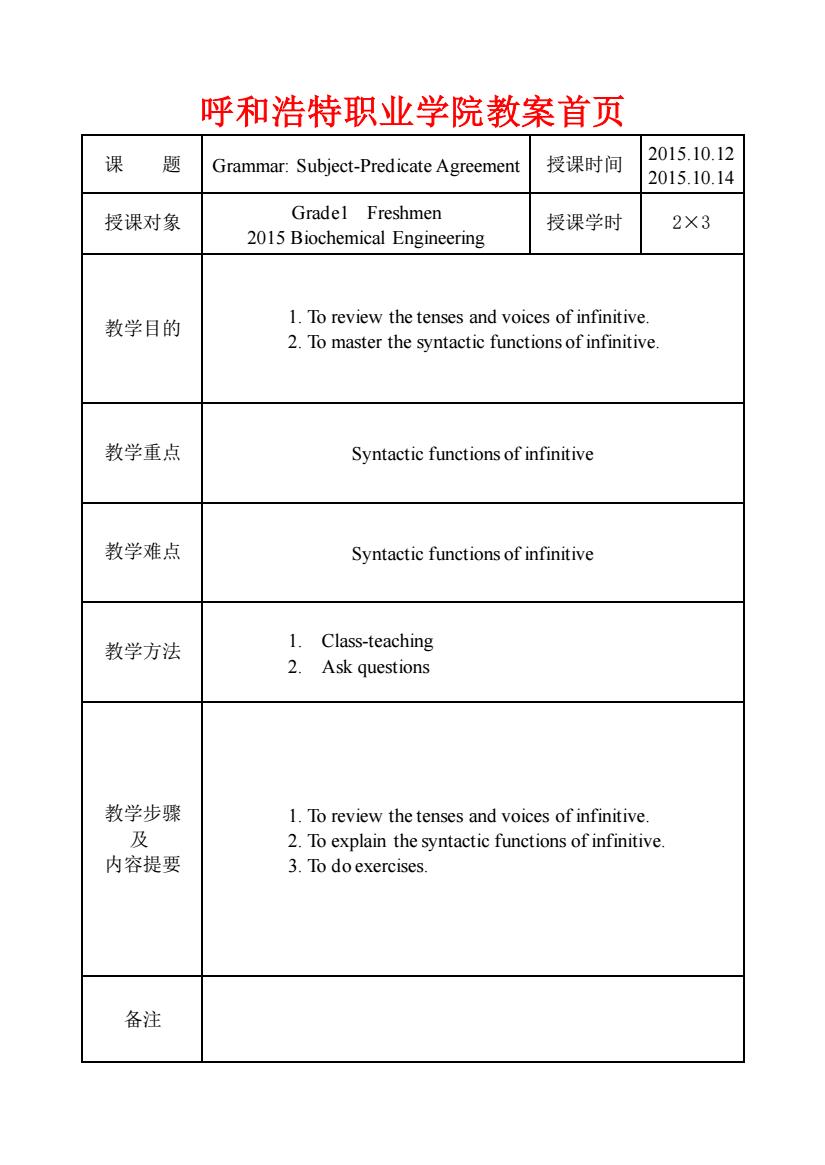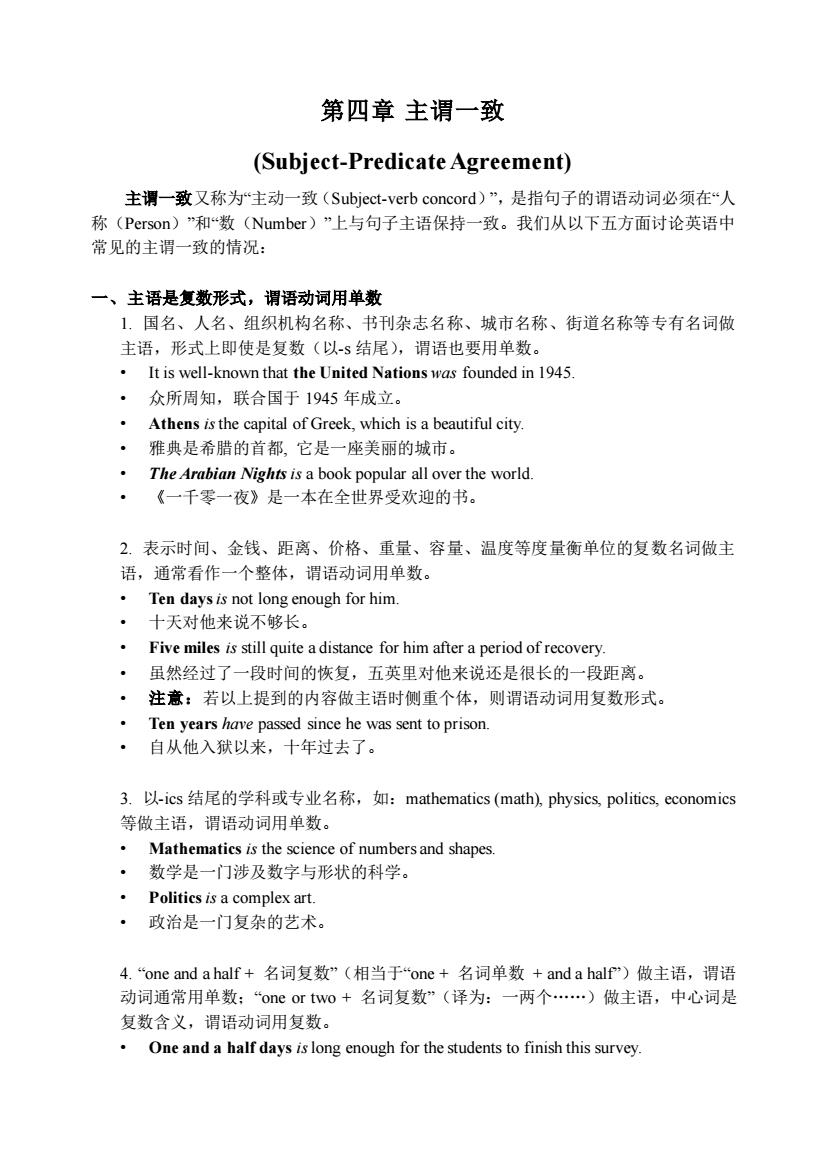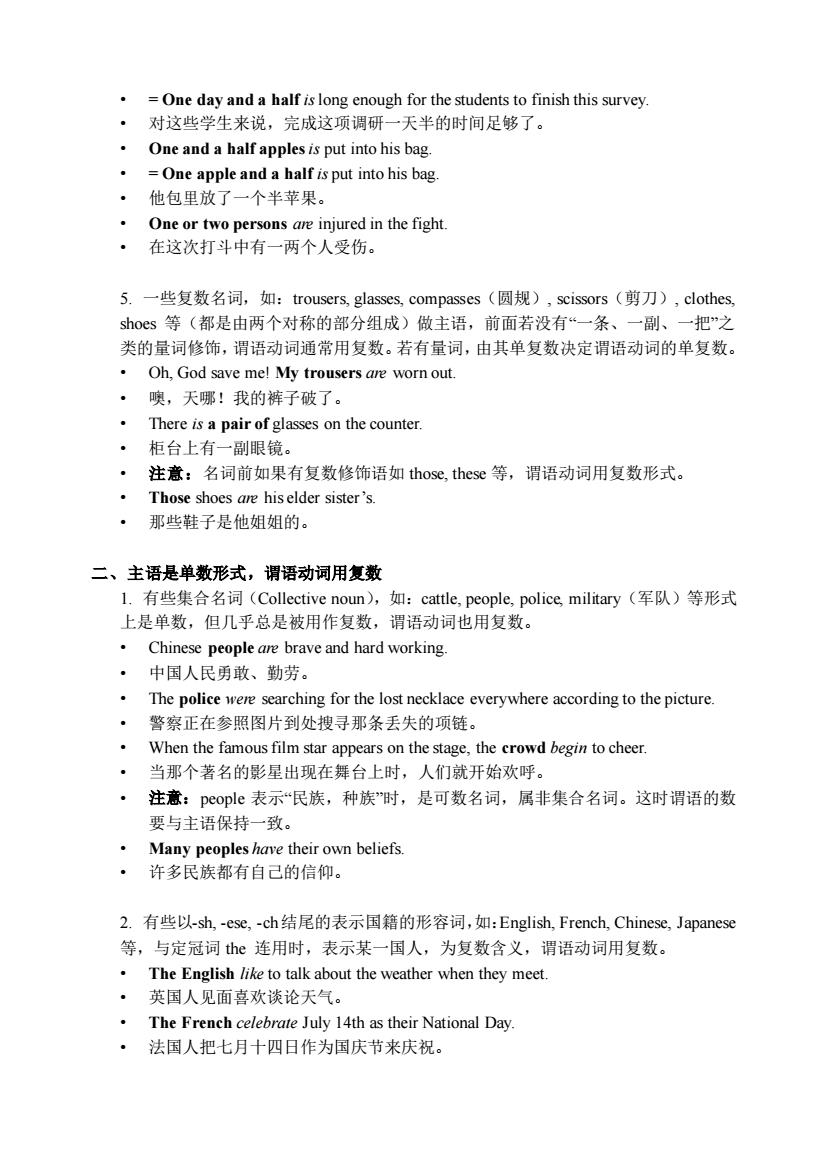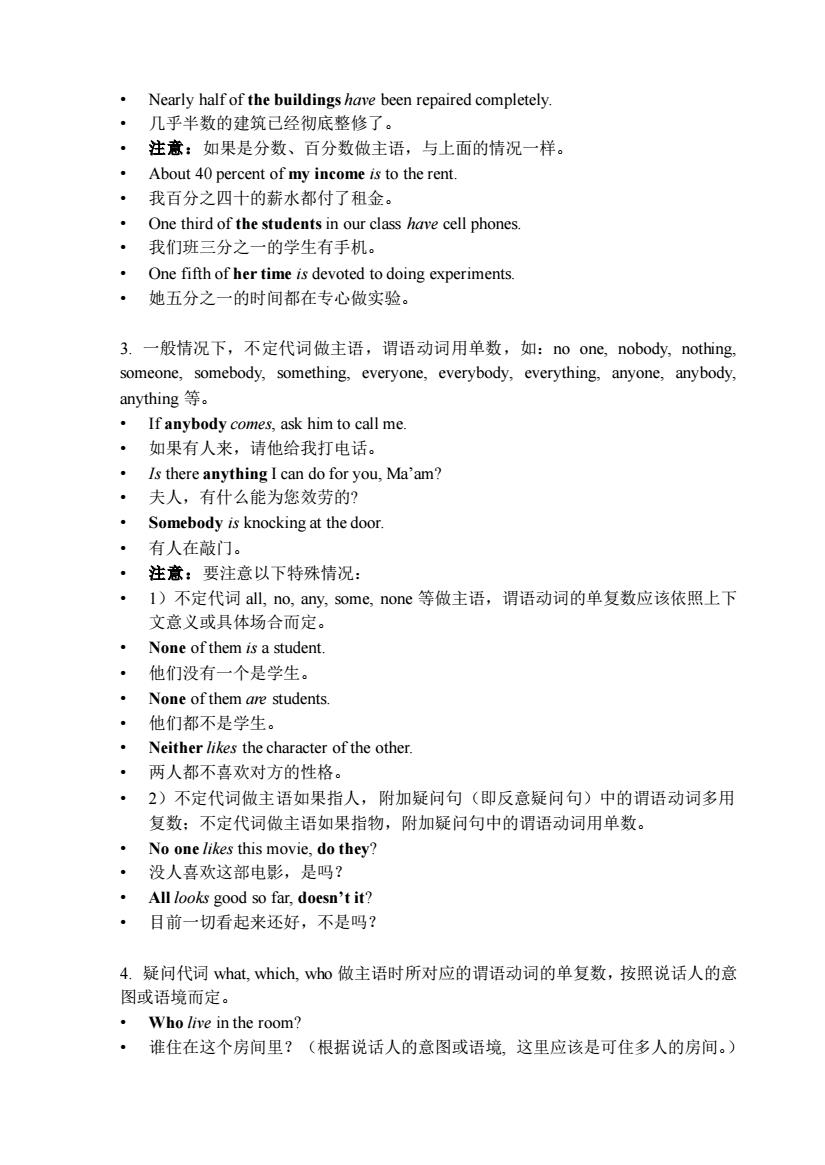
呼和浩特职业学院教案首页 课 题 授课时间 2015.10.12 Grammar:Subject-Predicate Agreement 2015.10.14 授课对象 Gradel Freshmen 授课学时 2×3 2015 Biochemical Engineering 教学目的 1.To review the tenses and voices of infinitive. 2.To master the syntactic functions of infinitive 教学重点 Syntactic functions of infinitive 教学难点 Syntactic functions of infinitive 教学方法 1. Class-teaching 2.Ask questions 教学步骤 1.To review the tenses and voices of infinitive 及 2.To explain the syntactic functions of infinitive. 内容提要 3.To doexercises. 备注
呼和浩特职业学院教案首页 课 题 Grammar: Subject-Predicate Agreement 授课时间 2015.10.12 2015.10.14 授课对象 Grade1 Freshmen 2015 Biochemical Engineering 授课学时 2×3 教学目的 1. To review the tenses and voices of infinitive. 2. To master the syntactic functions of infinitive. 教学重点 Syntactic functions of infinitive 教学难点 Syntactic functions of infinitive 教学方法 1. Class-teaching 2. Ask questions 教学步骤 及 内容提要 1. To review the tenses and voices of infinitive. 2. To explain the syntactic functions of infinitive. 3. To do exercises. 备注

第四章主谓一致 (Subject-Predicate Agreement) 主谓一致又称为“主动一致(Subject-verb concord)”,是指句子的谓语动词必须在“人 称(Person)"和“数(Number)”上与句子主语保持一致。我们从以下五方面讨论英语中 常见的主谓一致的情况: 一、主语是复数形式,谓语动词用单数 1,国名、人名、组织机构名称、书刊杂志名称、城市名称、街道名称等专有名词做 主语,形式上即使是复数(以-s结尾),谓语也要用单数。 It is well-known that the United Nations was founded in 1945. 众所周知,联合国于1945年成立。 Athens is the capital of Greek,which is a beautiful city. 雅典是希腊的首都,它是一座美丽的城市。 The Arabian Nights is a book popular all over the world. 《一千零一夜》是一本在全世界受欢迎的书。 2.表示时间、金钱、距离、价格、重量、容量、温度等度量衡单位的复数名词做主 语,通常看作一个整体,谓语动词用单数。 Ten days is not long enough for him. ·十天对他来说不够长。 Five miles is still quite adistance for him after a period of recovery. 虽然经过了一段时间的恢复,五英里对他来说还是很长的一段距离。 ·注意:若以上提到的内容做主语时侧重个体,则谓语动词用复数形式。 Ten years have passed since he was sent to prison. ·自从他入狱以来,十年过去了。 3.以-ics结尾的学科或专业名称,如:mathematics(math),physics,politics,economics 等做主语,谓语动词用单数。 Mathematics is the science of numbers and shapes. ·数学是一门涉及数字与形状的科学。 .Polities is a complex art. ·政治是一门复杂的艺术。 4.“one and a half+名词复数”(相当于one+名词单数+and a half")做主语,谓语 动词通常用单数:“one or two+名词复数”(译为:一两个.)做主语,中心词是 复数含义,谓语动词用复数。 One and a half days is long enough for the students to finish this survey
第四章 主谓一致 (Subject-Predicate Agreement) 主谓一致又称为“主动一致(Subject-verb concord)”,是指句子的谓语动词必须在“人 称(Person)”和“数(Number)”上与句子主语保持一致。我们从以下五方面讨论英语中 常见的主谓一致的情况: 一、主语是复数形式,谓语动词用单数 1. 国名、人名、组织机构名称、书刊杂志名称、城市名称、街道名称等专有名词做 主语,形式上即使是复数(以-s 结尾),谓语也要用单数。 • It is well-known that the United Nations was founded in 1945. • 众所周知,联合国于 1945 年成立。 • Athens isthe capital of Greek, which is a beautiful city. • 雅典是希腊的首都, 它是一座美丽的城市。 • The Arabian Nights is a book popular all over the world. • 《一千零一夜》是一本在全世界受欢迎的书。 2. 表示时间、金钱、距离、价格、重量、容量、温度等度量衡单位的复数名词做主 语,通常看作一个整体,谓语动词用单数。 • Ten days is not long enough for him. • 十天对他来说不够长。 • Five miles is still quite a distance for him after a period of recovery. • 虽然经过了一段时间的恢复,五英里对他来说还是很长的一段距离。 • 注意:若以上提到的内容做主语时侧重个体,则谓语动词用复数形式。 • Ten years have passed since he was sent to prison. • 自从他入狱以来,十年过去了。 3. 以-ics 结尾的学科或专业名称,如:mathematics (math), physics, politics, economics 等做主语,谓语动词用单数。 • Mathematics is the science of numbers and shapes. • 数学是一门涉及数字与形状的科学。 • Politics is a complex art. • 政治是一门复杂的艺术。 4. “one and a half + 名词复数”(相当于“one + 名词单数 + and a half”)做主语,谓语 动词通常用单数;“one or two + 名词复数”(译为:一两个.)做主语,中心词是 复数含义,谓语动词用复数。 • One and a half days islong enough for the students to finish this survey

.=One day and a half is long enough for the students to finish this survey. ·对这些学生来说,完成这项调研一天半的时间足够了。 One and a half apples is put into his bag. =One apple and a half is put into his bag 他包里放了一个半苹果。 Oneor two persons are injured in the figh 在这次打斗中有一两个人受伤。 5.一些复数名词,如:trousers,glasses,compasses(圆规),scissors(剪刀),clothes. shos等(都是由两个对称的部分组成)做主语,前面若没有“一条、一副、一把之 类的量词修饰,谓语动词通常用复数。若有量词,由其单复数决定谓语动词的单复数。 Oh,God save me!My trousers are worn out ·噢,天哪!我的裤子破了。 There is a pair of glasses on the counter. 柜台上有一副眼镜。 注意:名词前如果有复数修饰语如those,.these等,谓语动词用复数形式。 Those shoes are his elder sister's. 那些鞋子是他姐姐的。 二、主语是单数形式,谓语动词用复数 L.有些集合名词(Collective noun,如:cattle,people,olcmilitary(军队)等形式 上是单数,但几乎总是被用作复数,谓语动词也用复数。 Chinese people are brave and hard working 中国人民勇敢、勤劳。 .The searching for the lost necklace everywhere according to the picture 警察正在参照图片到处搜寻那条丢失的项链。 When the famous film star appears on the stage,the erowd begin tocheer. 当那个著名的影星出现在舞台上时,人们就开始欢呼。 注意:people表示“民族,种族时,是可数名词,属非集合名词。这时谓语的数 要与主语保持一致。 Many peoples have their own beliefs ·许多民族都有自己的信仰。 2.有些以-sh,-ese,-ch结尾的表示国籍的形容词,如:English,French,Chinese,.Japanese 等,与定冠词th连用时,表示某一国人,为复数含义,谓语动词用复数。 The English like to talk about the weather when they meet. 英国人见面喜欢谈论天气。 The French celebrate July 14th as their National Day. 法国人把七月十四日作为国庆节来庆祝
• = One day and a half islong enough for the students to finish this survey. • 对这些学生来说,完成这项调研一天半的时间足够了。 • One and a half apples is put into his bag. • = One apple and a half is put into his bag. • 他包里放了一个半苹果。 • One or two persons are injured in the fight. • 在这次打斗中有一两个人受伤。 5. 一些复数名词,如:trousers, glasses, compasses(圆规), scissors(剪刀), clothes, shoes 等(都是由两个对称的部分组成)做主语,前面若没有“一条、一副、一把”之 类的量词修饰,谓语动词通常用复数。若有量词,由其单复数决定谓语动词的单复数。 • Oh, God save me! My trousers are worn out. • 噢,天哪!我的裤子破了。 • There is a pair of glasses on the counter. • 柜台上有一副眼镜。 • 注意:名词前如果有复数修饰语如 those, these 等,谓语动词用复数形式。 • Those shoes are his elder sister’s. • 那些鞋子是他姐姐的。 二、主语是单数形式,谓语动词用复数 1. 有些集合名词(Collective noun),如:cattle, people, police, military(军队)等形式 上是单数,但几乎总是被用作复数,谓语动词也用复数。 • Chinese people are brave and hard working. • 中国人民勇敢、勤劳。 • The police were searching for the lost necklace everywhere according to the picture. • 警察正在参照图片到处搜寻那条丢失的项链。 • When the famous film star appears on the stage, the crowd begin to cheer. • 当那个著名的影星出现在舞台上时,人们就开始欢呼。 • 注意:people 表示“民族,种族”时,是可数名词,属非集合名词。这时谓语的数 要与主语保持一致。 • Many peoples have their own beliefs. • 许多民族都有自己的信仰。 2. 有些以-sh, -ese, -ch结尾的表示国籍的形容词,如:English, French, Chinese, Japanese 等,与定冠词 the 连用时,表示某一国人,为复数含义,谓语动词用复数。 • The English like to talk about the weather when they meet. • 英国人见面喜欢谈论天气。 • The French celebrate July 14th as their National Day. • 法国人把七月十四日作为国庆节来庆祝

·注意:当这些词表示某种语言时,则转化为名词,一般用作单数,谓语动词也用 单数。 English is the language of Britain,the US,Australia and some other countries 英语是英国、美国、澳大利亚和其他一些国家的语言。 3.有些形容词,前面加上定冠词te表示一类人,其意义为复数,谓语动词也用复数。 有时甚至延伸到此类词的比较级与最高级形式中,如:the old,the young the living the wounded,the rich,the poor,the dead,the blind,the sick,the older,the oldest The old have splendid future behind them.The young have glorious future before them 。 老年人有辉煌的过去。年轻人有光辉灿烂的未来 The survival in the accident have been sent to hospital quickly 。 事故中的幸存者很快被送进了医院。 注意:如果此类形容词表示抽象事物做主语,则谓语动词用单数。 The bad in her oveneighs the good. 她身上的缺点多过优点。 三、主语是单数形式,谓语动词依具体情况而定 L.有些集合名词,如:family,clas,group,team,enemy,crowd,party,government,couple club,crew(全体人员),company(连队),public,audience,committee(委员会) population等做主语,分为两种情况:若作为一个整体,谓语动词用单数:若着眼于 组成该集体的每个成员或个体,谓语动词用复数。 The elass is in the charge of a beautiful girl. 一个漂亮的女孩负责这个班。 The class were taking notes in English when we passed by. 我们路过时,全班同学们正在用英语记笔记。 The committee have decided to accept the public advice. ·委员会委员们已决定接受公众的建议。 The committee is made up of seven members,including a doctor. ·委员会由七位成员组成,其中有一位医生。 After saying good-bye,the couple glimpsed each other and were lost in the crowd 互相道别后,夫妇两互相警了一眼,很快消失在人群中。 2.一些表示“部分概念”或“不定数量”的名词或代词做主语,形式上是单数,谓语动词 的单复数须依据of后面名词的单复数而定。如:half of,most of,the rest of,some of, none of等。 。 Half of the building is to be completed by the Spring Festiva ·在春节前这栋大楼将建成一半
• 注意:当这些词表示某种语言时,则转化为名词,一般用作单数,谓语动词也用 单数。 • English is the language of Britain, the US, Australia and some other countries. • 英语是英国、美国、澳大利亚和其他一些国家的语言。 3. 有些形容词,前面加上定冠词 the 表示一类人,其意义为复数,谓语动词也用复数。 有时甚至延伸到此类词的比较级与最高级形式中,如:the old, the young, the living, the wounded, the rich, the poor, the dead, the blind, the sick, the older, the oldest 等。 • The old have splendid future behind them. The young have glorious future before them. • 老年人有辉煌的过去。年轻人有光辉灿烂的未来。 • The survival in the accident have been sent to hospital quickly. • 事故中的幸存者很快被送进了医院。 • 注意:如果此类形容词表示抽象事物做主语,则谓语动词用单数。 • The bad in her overweighs the good. • 她身上的缺点多过优点。 三、主语是单数形式,谓语动词依具体情况而定 1. 有些集合名词,如:family, class, group, team, enemy, crowd, party, government, couple, club, crew(全体人员), company(连队), public, audience, committee(委员会), population 等做主语,分为两种情况:若作为一个整体,谓语动词用单数;若着眼于 组成该集体的每个成员或个体,谓语动词用复数。 • The class is in the charge of a beautiful girl. • 一个漂亮的女孩负责这个班。 • The class were taking notes in English when we passed by. • 我们路过时,全班同学们正在用英语记笔记。 • The committee have decided to accept the public advice. • 委员会委员们已决定接受公众的建议。 • The committee is made up of seven members, including a doctor. • 委员会由七位成员组成,其中有一位医生。 • After saying good-bye, the couple glimpsed each other and were lost in the crowd quickly. • 互相道别后,夫妇俩互相瞥了一眼,很快消失在人群中。 2. 一些表示“部分概念”或“不定数量”的名词或代词做主语,形式上是单数,谓语动词 的单复数须依据 of 后面名词的单复数而定。如:half of, most of, the rest of, some of, none of 等。 • Half of the building isto be completed by the Spring Festival. • 在春节前这栋大楼将建成一半

.Nearly half of the buildings have been repaired completely. ·几乎半数的建筑己经彻底整修了。 注意:如果是分数、百分数做主语,与上面的情况一样。 About 40 percent of my income is to the ren ·我百分之川十的薪水都付了用金。 One third of the students in our class have cell phones ·我们班三分之一的学生有手机 One fifth of her time is devoted to doing experiments ·地五分之一的时间都在专心做实哈。 3.一般情况下,不定代词做主语,谓语动词用单数,如:no one,nobody,nothing. someone,somebody,something.everyone,everybody,everything.anyone,anybody, anything等。 If anybody comes,ask him to call me. ·如果有人来,请他给我打电话。 Is there anything I can do for you,Ma'am? ·夫人,有什么能为您效劳的? Somebody is knocking at the door 有人在敲门。 注意:要注意以下特殊情况 ·I)不定代词al,no,any,some,none等做主语,谓语动词的单复数应该依照上下 文意义或具体场合而定。 None of them is a student 他们没有一个是学生。 None of then m are students 他们都不是学生。 Neither likes the cha acter of the other. 两人都不喜欢对方的性格。 2)不定代词做主语如果指人,附加疑问句(即反意疑问句)中的谓语动词多用 复数:不定代词做主语如果指物,附加疑问句中的谓语动词用单数。 No one likes this movie,do they? 没人喜欢这部电影,是吗? All looks good so far,doesn't it? ·目前一切看起来还好,不是吗? 4.疑问代词what,which,.who做主语时所对应的谓语动词的单复数,按照说话人的意 图或语境而定 ·Who live in the room? 谁住在这个房间里? (根据说话人的意图或语境,这里应该是可住多人的房间。》
• Nearly half of the buildings have been repaired completely. • 几乎半数的建筑已经彻底整修了。 • 注意:如果是分数、百分数做主语,与上面的情况一样。 • About 40 percent of my income is to the rent. • 我百分之四十的薪水都付了租金。 • One third of the students in our class have cell phones. • 我们班三分之一的学生有手机。 • One fifth of her time is devoted to doing experiments. • 她五分之一的时间都在专心做实验。 3. 一般情况下,不定代词做主语,谓语动词用单数,如:no one, nobody, nothing, someone, somebody, something, everyone, everybody, everything, anyone, anybody, anything 等。 • If anybody comes, ask him to call me. • 如果有人来,请他给我打电话。 • Is there anything I can do for you, Ma’am? • 夫人,有什么能为您效劳的? • Somebody is knocking at the door. • 有人在敲门。 • 注意:要注意以下特殊情况: • 1)不定代词 all, no, any, some, none 等做主语,谓语动词的单复数应该依照上下 文意义或具体场合而定。 • None of them is a student. • 他们没有一个是学生。 • None of them are students. • 他们都不是学生。 • Neither likes the character of the other. • 两人都不喜欢对方的性格。 • 2)不定代词做主语如果指人,附加疑问句(即反意疑问句)中的谓语动词多用 复数;不定代词做主语如果指物,附加疑问句中的谓语动词用单数。 • No one likes this movie, do they? • 没人喜欢这部电影,是吗? • All looks good so far, doesn’t it? • 目前一切看起来还好,不是吗? 4. 疑问代词 what, which, who 做主语时所对应的谓语动词的单复数,按照说话人的意 图或语境而定。 • Who live in the room? • 谁住在这个房间里?(根据说话人的意图或语境, 这里应该是可住多人的房间。)